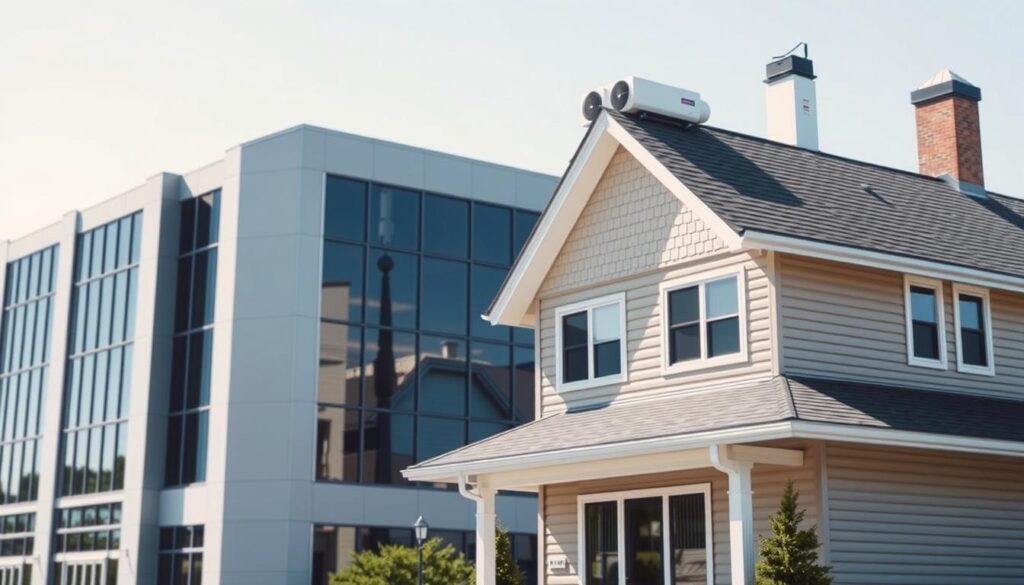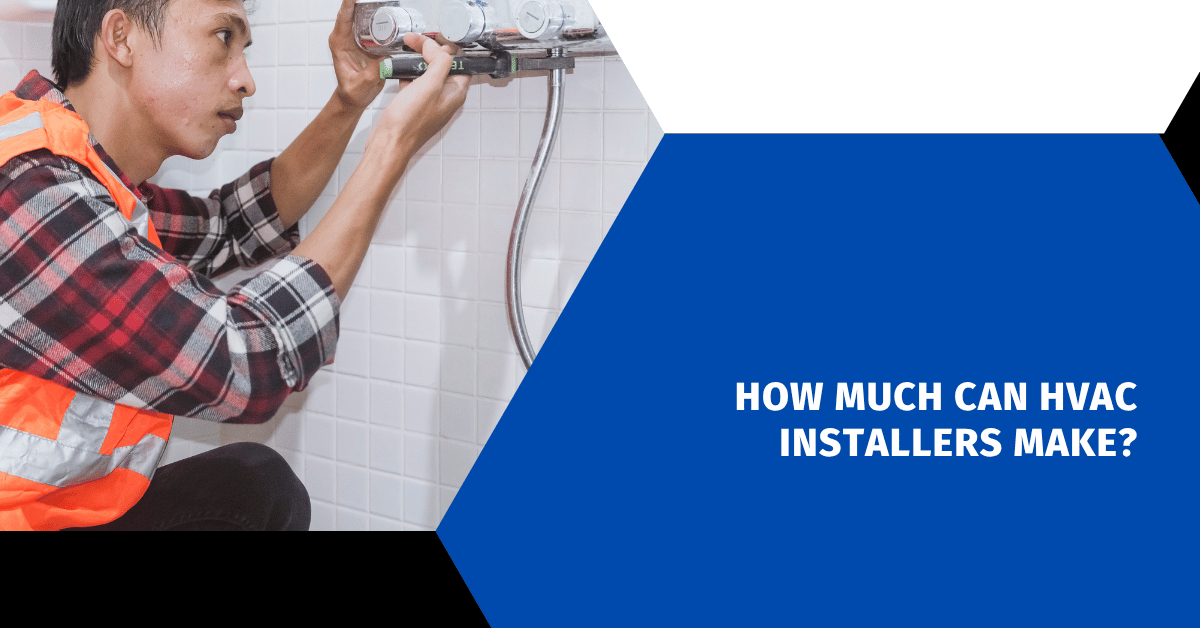Affiliate Disclosure
HVAC Guide Guys is a participant in the Amazon Services LLC Associates Program, an affiliate advertising program designed to provide a means for sites to earn advertising fees by advertising and linking to Amazon.
How Much Can HVAC Installers Make? Are you wondering how much you can earn as an HVAC installer? This job can turn your technical skills into a well-paying career. It offers stability and chances for growth. HVAC installation is more than fixing air conditioning units. It’s about building a rewarding career with great earning possibilities.

The U.S. Bureau of Labor Statistics says HVAC installer salaries are attractive. The median annual wage is $50,590. But, your actual earnings can change a lot based on several factors.
Your earnings as an HVAC installer depend on many things. Experience, location, specialization, and extra certifications all play a big role. From starting jobs to advanced technical roles, the HVAC field has many ways to increase your salary.
Key Takeaways
- HVAC installers have a median annual wage of $50,590
- Salary varies by experience and specialization
- Location is key in determining income
- Certifications can greatly increase earnings
- Career growth opportunities are plentiful in HVAC
Table of Contents
Understanding HVAC Installer Career Opportunities
The HVAC industry is full of exciting career paths for those who love technical skills and solving problems. Your earning power starts with knowing the career landscape and how to grow.
The job market for HVAC pros is growing fast. The U.S. Bureau of Labor Statistics says there will be a 9% increase in HVAC technician jobs from 2023 to 2033. This is much faster than many other industries.
Entry-Level Requirements and Qualifications
To start your HVAC career, you need to meet certain educational and training standards:
- High school diploma or equivalent
- Technical training program or apprenticeship
- Basic math and mechanical skills
- Physical fitness for hands-on work
Career Path Progression
HVAC professionals can move up through different stages, increasing their earnings:
- Apprentice Technician: Initial learning phase
- Journeyman Technician: Independent work capabilities
- Master Technician: Advanced skills and supervision roles
- HVAC Manager/Business Owner: Leadership positions
Job Market Demand
The need for skilled HVAC installers is high in residential, commercial, and industrial areas. Specializing in green technology and energy-efficient systems can boost your career and earnings.
Explore Our HVAC Shop
Looking for top-rated HVAC tools, parts, and accessories? Visit our shop and find the perfect solution for your needs.
Visit the ShopHow Much Can HVAC Installers Make Across Different Experience Levels
Knowing how much HVAC installers make is key for those thinking about a career in this field. Your salary can change a lot based on your experience and skills.
Starting HVAC contractors usually earn good pay. Newbies can make about $35,000 to $45,000 a year. These early years are important for learning the ropes and getting real-world experience.
- Entry-Level (0-2 years): $35,000 – $45,000
- Mid-Level (3-5 years): $45,000 – $60,000
- Experienced (6-10 years): $60,000 – $75,000
- Senior Technicians (10+ years): $75,000 – $90,000
As you get more experience, your pay goes up a lot. Mid-level techs with 3-5 years of experience can make $45,000 – $60,000. Those with 6-10 years of experience can earn $60,000 to $75,000.
Senior techs with over 10 years of experience can make up to $90,000 a year. Their higher salaries show they have advanced skills, deep knowledge, and a strong track record in HVAC.
Your earning power grows with your expertise, certifications, and specialized skills in HVAC.
Top-Paying States for HVAC Installation Professionals
Your chances of finding a good HVAC installer job can change a lot based on where you are. Some places pay a lot more than others. This makes where you live very important for your career.
Looking at the best places for HVAC jobs, some states really stand out. They offer great pay that’s way above the national average. These places offer big opportunities for HVAC pros.
Highest-Paying Metropolitan Areas
Big cities with lots of skilled tech jobs usually pay the most. Places like Alaska, Massachusetts, and New Jersey are at the top for HVAC pay.
| State | Average Annual Salary | Top Metropolitan Areas |
|---|---|---|
| Alaska | $75,660 | Anchorage |
| Massachusetts | $73,990 | Boston |
| New Jersey | $70,500 | Newark |
Regional Salary Variations
Salaries vary for a few reasons:
- Local industry demand
- Complexity of installation projects
- Technological sophistication of the market
Cost of Living Considerations
High salaries are nice, but you also need to think about the cost of living. A high wage in a pricey city might not go as far as a lower salary in a cheaper area.
When looking for a job, don’t just look at the salary. Understand the whole economic picture of the area you’re considering.
Explore Our HVAC Shop
Looking for top-rated HVAC tools, parts, and accessories? Visit our shop and find the perfect solution for your needs.
Visit the ShopSalary Comparison: Commercial vs. Residential HVAC Installation

Exploring hvac professional income, you’ll find big differences between commercial and residential HVAC. Each offers unique salary structures and job needs. This affects your career path greatly.
Commercial HVAC installers usually make more money than those in residential. This pay gap comes from several reasons:
- Project complexity and scale
- Technical expertise required
- System sophistication
- Specialized equipment knowledge
Residential HVAC work is simpler, dealing with basic home systems. But, commercial HVAC needs advanced skills. It involves complex systems in big places like offices and hospitals.
“The complexity of commercial HVAC systems directly correlates with higher earning for skilled pros.” – HVAC Industry Expert
Your earnings can change a lot based on your focus. Commercial HVAC pros can earn 20-30% more than residential ones. This depends on where you work and your skills.
Deciding between commercial and residential HVAC depends on your skills, goals, and income wants. Think about your strengths and interests. Choose the path that fits your career dreams.
Essential Certifications That Boost HVAC Installer Income
Certifications are key to how much HVAC installers can earn. Getting the right certifications can really boost your salary and open up new job paths.
Getting certified shows you’re an expert in HVAC. It proves your skills and can lead to better pay.
NATE Certification: A Career Game Changer
North American Technician Excellence (NATE) certification is top-notch for HVAC pros. Getting NATE certified can:
- Show you know your stuff
- Make you more valuable in the job market
- Help you earn 10-15% more
- Show employers you’re a pro
EPA Certifications: Critical for Professional Growth
EPA certifications are a must for working with refrigerants. The EPA 608 Certification has different levels. Each level lets you do more and earn more in HVAC.
State-Specific License Requirements
Many states need special licenses for HVAC installers. These rules can change, but following them can mean more money and more jobs. Check your state’s rules to make more money.
By choosing the right certifications, you can really up your salary. You’ll also become a leading figure in the HVAC world.
Factors Affecting HVAC Installer Compensation
Knowing what affects hvac technician income can help you earn more. Several important factors influence how much you can make in the HVAC field.
Your career growth and earnings depend on many things:
- Years of professional experience
- Geographical location and regional demand
- Specialized technical skills
- Professional certifications
- Work environment complexity
Experience is a big factor in how much you can earn. New technicians usually start with lower pay. But, those with 10+ years of experience can earn much more.
| Experience Level | Average Annual Income | Potential Earnings Range |
|---|---|---|
| Entry-Level (0-2 years) | $35,000 – $42,000 | Lower-end market rates |
| Mid-Career (5-9 years) | $50,000 – $65,000 | Steady growth |
| Senior-Level (10+ years) | $70,000 – $90,000 | High-end markets |
Where you work also affects your pay. Urban areas with extreme climates or high construction activity often pay more.
Getting advanced certifications and skills can really increase your income. Technicians with EPA certification or skills in complex systems like commercial refrigeration get paid more.
Explore Our HVAC Shop
Looking for top-rated HVAC tools, parts, and accessories? Visit our shop and find the perfect solution for your needs.
Visit the ShopAdvanced Skills That Command Higher Pay Rates
In the competitive world of HVAC installation, standing out means developing specialized skills. These skills boost your heating and cooling technician wages. Advanced expertise can significantly impact your hvac contractor pay, opening doors to more lucrative opportunities.
Successful HVAC professionals understand that continuous learning is key to career advancement. Your ability to master cutting-edge technologies and specialized skills can dramatically increase your market value.
Technical Specializations
Technical specializations can set you apart in the HVAC industry. Consider focusing on these high-demand areas:
- Green HVAC technologies
- Industrial refrigeration systems
- Advanced climate control solutions
- Renewable energy integration
Emerging Technologies Expertise
Smart technologies are revolutionizing the HVAC landscape. Professionals who understand and implement these innovations can command premium heating and cooling technician wages.
| Technology | Potential Salary Increase |
|---|---|
| IoT-enabled HVAC systems | 15-25% higher pay |
| AI-driven energy management | 20-30% salary boost |
| Advanced diagnostic technologies | 10-20% wage increase |
Project Management Skills
Beyond technical knowledge, developing strong project management capabilities can elevate your hvac contractor pay. Skills like communication, budget management, and team coordination are increasingly valuable.
- Learn advanced project planning techniques
- Develop leadership and communication skills
- Understand budgeting and resource allocation
- Gain experience in large-scale HVAC installations
Investing in your skill set is the most reliable path to increasing your earning in the HVAC industry.
Benefits and Additional Compensation Packages

When looking at hvac installer jobs, smart people see that pay is more than just a salary. Top HVAC companies know how important it is to offer great benefits. They want to attract and keep skilled technicians.
Typical benefits for HVAC installation pros include:
- Comprehensive health insurance coverage
- Retirement savings plans with company matching
- Paid vacation and personal time
- Performance-based bonuses
- Professional development opportunities
Many employers know that good pay is key in a field that’s always in demand. Skilled HVAC installers can get extra perks that make their total pay package very appealing:
- Tool allowances
- Vehicle maintenance reimbursement
- Continuing education support
- Safety equipment provisions
Your pay can go up with special skills and certifications. Companies often give extra money for advanced training and showing off your HVAC tech skills.
A strong benefits package can really boost your air conditioning installer pay.
Explore Our HVAC Shop
Looking for top-rated HVAC tools, parts, and accessories? Visit our shop and find the perfect solution for your needs.
Visit the ShopGrowth Potencial and Career Advancement Opportunities
The HVAC industry offers exciting career paths for ambitious professionals. Your income can grow a lot as you gain experience and skills. Many technicians move up by exploring different career paths.
Career growth in HVAC installation has several key paths:
- Supervisory and management roles
- Technical specialization
- Independent business ownership
- Advanced technical training
With more certifications and skills, your income can increase. Those with 7+ years of experience can earn up to $87,700 annually, according to data.
| Career Stage | Potential Income Range | Key Opportunities |
|---|---|---|
| Entry Level | $35,000 – $45,000 | Basic installation, learning fundamentals |
| Mid-Career | $50,000 – $70,000 | Specialization, team leadership |
| Senior Level | $75,000 – $90,000 | Management, consulting, business ownership |
Your success depends on continuous learning and staying updated with new HVAC technologies. By investing in your skills, you can achieve significant career growth in this dynamic field.
Conclusion
The HVAC installation industry is booming, with great opportunities for those who want to grow their skills. As the U.S. HVAC services market expands, so does your chance to earn a good salary. By getting specialized training, getting key certifications, and keeping up with new tech, you can boost your earnings.
To understand how much HVAC installers can make, it’s key to keep learning and being flexible. Places like California, Texas, and New York are hotspots for skilled technicians. By mastering advanced skills and getting professional certifications, you can stand out in this fast-paced field.
The HVAC installation career path is full of promise for those who love technical work and want to grow. With the right skills, certifications, and career strategy, you can build a successful and fulfilling career. The future is bright for HVAC installation pros ready to meet the market’s needs.
Your success in HVAC installation depends on your eagerness to learn, adapt, and grow professionally. Stay updated on industry trends, tech advancements, and local market needs. This way, you’ll become a valuable HVAC installation pro with great earning possibilities.

